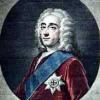Lord Chesterfield

Lord Chesterfield
Philip Dormer Stanhope, 4th Earl of Chesterfield KG PCwas a British statesman, and a man of letters, and wit. He was born in London to Philip Stanhope, 3rd Earl of Chesterfield, and Lady Elizabeth Savile, and known as Lord Stanhope until the death of his father, in 1726. Educated at Trinity Hall, Cambridge, he subsequently embarked on the Grand Tour of the Continent, to complete his education as a nobleman, by exposure to the cultural legacies of Classical antiquity and...
mean perfection doe
Business by no means forbids pleasures; on the contrary, they reciprocally season each other; and I will venture to affirm that noman enjoys either in perfection that does not join both.
drinking writing gentleman
I can hardly bring myself to caution you against drinking, because I am persuaded that I am writing to a rational creature, a gentleman, and not to a swine. However, that you may not be insensibly drawn into that beastly custom of even sober drinking and sipping, as the sots call it, I advise you to be of no club whatsoever.
hate ambition passion
There is nothing so necessary, but at the same time there is nothing more difficult (I know it by experience) for you young fellows, than to know how to behave yourselves prudently towards those whom you do not like. Your passions are warm, and your heads are light; you hate all those who oppose your views, either of ambition or love; and a rival, in either, is almost a synonymous term for any enemy.
fear people way
The best way to compel weak-minded people to adopt our opinion, is to frighten them from all others, by magnifying their danger.
fear degrees produce
A certain degree of fear produces the same effects as rashness.
suicide looks look-up
I look upon indolence as a sort of suicide.
sympathy grief letters
When griefs are genuine, I find, there is nothing more vacuous, more burdensome, or even more impertinent, than letters of consolation.
gratitude dog powerful
The great, the rich, the powerful, too often bestow their favours upon their inferiors in the manner they bestow their scraps upontheir dogs, so as neither to oblige man nor dogs. It is no wonder if favours, benefits, and even charities thus bestowed ungraciously, should be as coldly and faintly acknowledged.
flower generosity benefits
Let us not only scatter benefits, but even strew flowers for our fellow-travellers, in the rugged ways of this wretched world.
kings giving waiting
Were you to converse with a king, you ought to be as easy and unembarrassed as with your own valet-de chambre; but yet every look,word, and action should imply the utmost respect.... You must wait till you are spoken to; you must receive, not give, the subject of conversation, and you must even take care that the given subject of such conversation do not lead you into any impropriety.
leadership reflection knowing
The rulers of the earth are all worth knowing; they suggest moral reflections: and the respect that one naturally has for God's vice-regents here on earth is greatly increased by acquaintance with them.
mistake pride men
Men are apt to mistake, or at least to seem to mistake, their own talents, in hopes, perhaps, of misleading others to allow them that which they are conscious they do not possess. Thus lord Hardwicke valued himself more upon being a great minister of state, which he certainly was not, than upon being a great magistrate, which he certainly was.
giving charity merit
Give nobly to indigent merit, and do not refuse your charity even to those who have not merit but their misery.
success loss want
The greatest dangers have their allurements, if the want of success is likely to be attended with a degree of glory. Middling dangers are horrid, when the loss of reputation is the inevitable consequence of ill success.